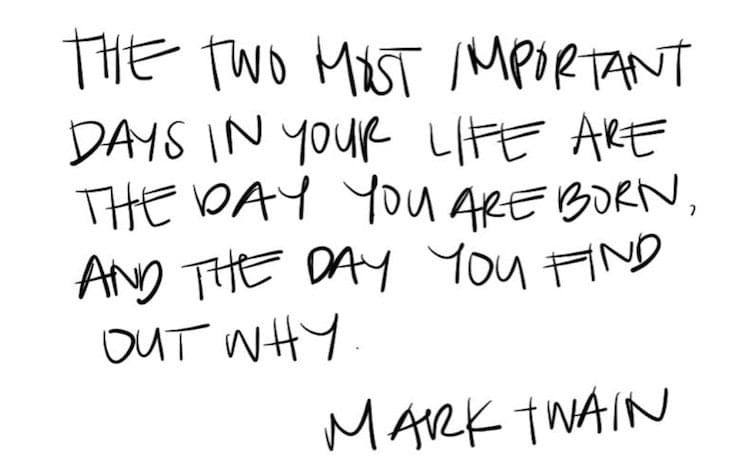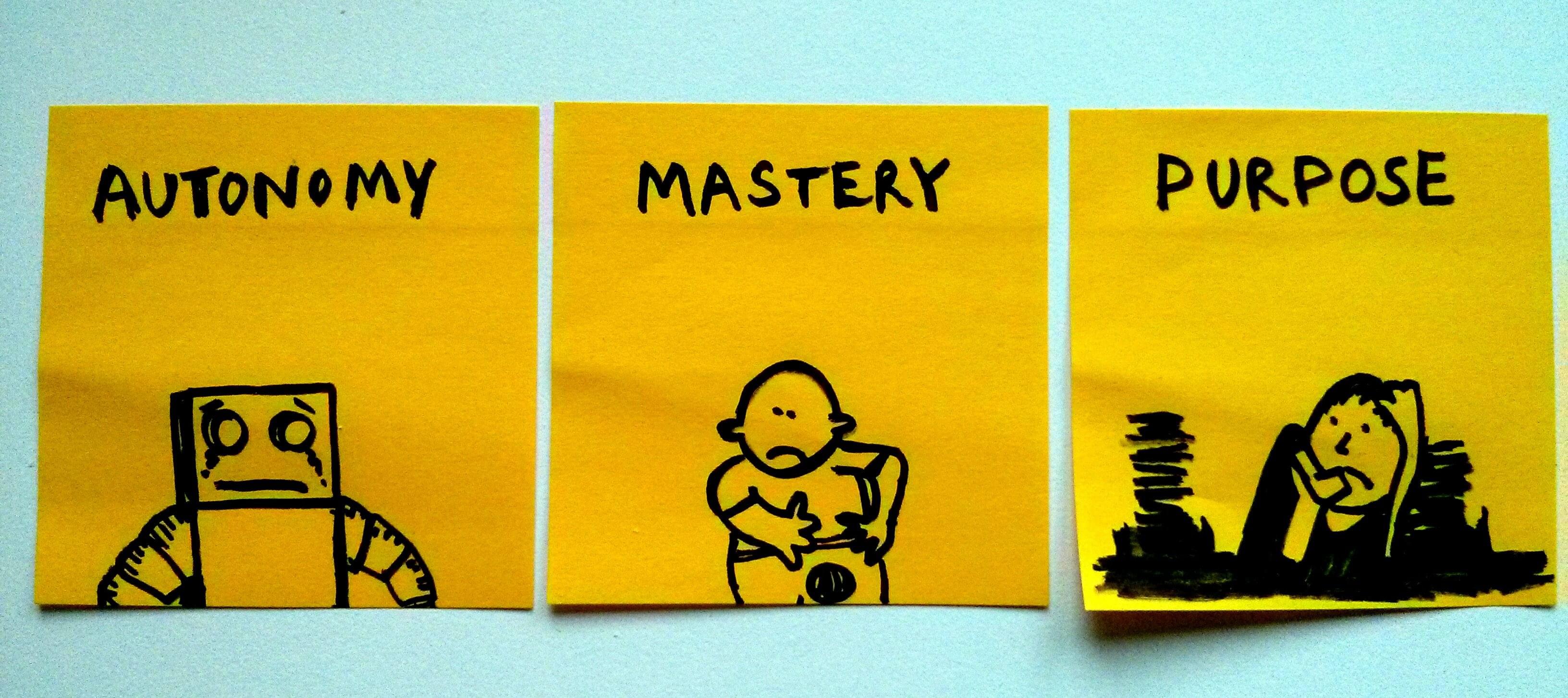Keep up with the latest hiring trends!

What is the number one reason that someone accepts a job? I’ll give you a hint; the absence of this is also the number one reason that people quit jobs. Got it yet? “Money” I hear you cry. Cash, better benefits, more time off.
But no, that’s not it.
I reason that someone accepts a job is meaning, direction, and purpose. If you’ve ever asked yourself “What is the meaning of life?”, the answer is right there in front of you…it’s meaning!. Our desire to find meaning, to find purpose is innate. But too often we fail to articulate it.
So, what exactly is purpose?
 In his excellent book, “Drive, the Surprising Truth about what Motivates Us,” Daniel Pink’s research uncovered 3 factors that lead to better performance and personal satisfaction in the workplace: autonomy, mastery and purpose.
In his excellent book, “Drive, the Surprising Truth about what Motivates Us,” Daniel Pink’s research uncovered 3 factors that lead to better performance and personal satisfaction in the workplace: autonomy, mastery and purpose.
Autonomy is all about our innate preference to be driven by an internal locus of control rather than an external “you must do this” voice. Motivation, Pink argues, starts with feeling in control of your own decisions. Mastery is all about the satisfaction you feel from learning something new, from improving or mastering a technique or process. It turns out that motivation involves personal development, a measurement of the return of your effort.
But it’s the last ingredient that I find most interesting and most universally applicable and that’s purpose, something that author Aaron Daniels describes as a verb, not a noun.
How Purpose Influences Recruiting
Purpose is the key to unlocking how we engage with candidates, get them interested in our jobs, how we differentiate our employer brands and how we improve employee engagement and retention. In his must read book “The Purpose Economy”, Aaron Daniels states that “seeking our purpose is about finding a direction, not a destination.” But what does this mean?
I recently watched “The Intern”, the Robert de Niro movie about a recently bereaved guy in his 70s who takes an internship within Anne Hathaway’s e-commerce start-up. Yes, it’s overly sentimental but it struck me that the entire movie is about purpose. De Niro’s character, retired and obviously pretty well-off, is not looking for additional income when he decides to apply for the “Reverse Internship.” What he is looking for is meaning.
As the movie unfolds, you see him transform as colleagues come to rely on him and his contributions begin to impact the various characters in the movie. For her part, Anne Hathaway’s character is about to be ousted from her CEO role by her VC backers but re-discovers her drive to make online shopping better for her customers, to add that “+1” touch that an external CEO wouldn’t understand. Both characters are seeking purpose yet find it in very different ways. The same goes for your candidates, and can even apply to you!
The 3 Types of Purpose
When most people think of purpose, they think of saving whales or rainforests or some marginalised group in need of our aid. Yes, it can mean that, but that’s not the full extent of purpose and its power.
Daniels suggests that there are 3 types of purpose: Personal, social and societal.
- Personal purpose is derived from the satisfaction in doing the things that we love, trying out new things and expressing ourselves (think of all those designers pouring their hearts into the products they sell on sites like Etsy).
- Social purpose comes from bringing people together; it could be working for your family’s business, feeling like you are the lynchpin in your team or knowing that because of you, your employer’s customers always leave with a smile on their face.
- Societal purpose is about doing something beyond yourself, working for a non-profit or a company that makes environmentally friendly products. It’s the one that most people think of first (and last) when we discuss Purpose.
How to Articulate Purpose (What Toddlers Can Teach Us)

“But Why Daddy…but why?”
Can purpose be found in absolutely every role or employer and if so, how can we define and articulate it? I speak a lot at various recruiting conferences and I enjoy asking the audience to challenge me to find purpose in the roles that they are currently hiring for. It’s a lot of fun. Undertaker anyone?
The trick that I recommend is something professionals call “5Whys” or those of us with young kids called “But Why Daddy…but why?” Don’t focus on the responsibilities, this is not what you are selling. Ask why this person is being hired? Why does this role exist? Why do we need that department? Why do customers value this? What does this allow your customers to now do or do better? Any role or company can be articulated in terms of purpose if you ask 5 Whys. Can’t do that? Then the job you are recruiting for is probably not really needed!
How Teach First Uses Purpose to Build Their Employer Brand
One of the best examples I’ve seen of purpose marketing in employer branding is from Teach First in the UK. In this excellent video they “sell” teaching as a career by focusing not on the responsibilities of a teacher or even the environment of the school but on the impact one teacher had on one troubled kid, told in a rhyming rap to camera by that kid. It’s moving. Heck, even I wanted to be a teacher after I watched it! I challenge you to set this as your bar. This is the standard you should strive to meet and then exceed.
3 Ways You Can Use Purpose Marketing for Recruiting:
This isn’t intended to be some fluffy piece on how we can all save the world and feel good about ourselves. This should be actionable, ready for you to use right now. Here’s 3 ways you can use purpose to Power your recruiting efforts as soon as you finish reading this article:
1. Purpose-centric job ads
The next job ad you write, try to lead with purpose. Tell a simple, unexpected, concrete, credible story (SUCCESs) that highlights purpose at its core. Force yourself to use less we, us, our and more you, your, yours. It’s proven in research studies to increase the volume of qualified applicants 6 fold!
2. Purpose-driven messaging
The next time you reach out to a passive candidate, whether it’s by InMail, email or phone, pitch purpose first. By sentence two, ask the candidate a question like “are you interested in helping other people to find their dream job whilst earning enough money to put your kids through college and live in your dream home?” This could be your purpose pitch to a potential recruiter. What’s your current pitch? “Are you interested in moving jobs?” #Lame.
3. Purpose-oriented employer branding
Have a look at your career site, your career videos and employee testimonials. Are you sharing your employee’s purpose stories? Anything else is a waste of your time. Your whole messaging should be about these powerful, personal purpose stories. The story is not your company and it’s not the stories of what people do at your company, it’s why they do it! It’s their purpose story. Share that and you’ll win the war for talent (and feel much better for it to!).
Feel pumped about the power of purpose? Share this article with your network and inspire others to take action. Recruiting with purpose is not just better, it means something.
Related Articles
Find out how the likes of IBM, IKEA and Siemens
drive hiring excellence with SocialTalent
drive hiring excellence with SocialTalent


